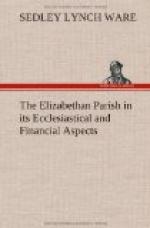Non-parishioners, or “foreigners,” were viewed with the strongest suspicion. Generally they were discriminated against if they happened to have dealings with the parish. Wedding or funeral fees were doubled in their cases.[323] If the parishioners could have had their will no alien poor could have gained a settlement amongst them—no, not even after twenty years’ residence. In 1598 the West Riding, Yorkshire, justices were compelled to interfere in favor of divers poor persons in various parishes, where officers were seeking to expel them as vagrants born elsewhere, though they had been domiciled in their adopted communities for twenty years and upwards.[324]
Already that “organized hypocrisy,” so characteristic of parish life in later reigns, shows itself in the many presentments of, and petitions against, persons supposedly immoral—especially single women. Not zeal for morality prompts these indictments, but fear that the community may have to support illegitimate children.[325] Quite typical of the times is the language held by the inhabitants of Castle Combe in appealing to the Wiltshire justices against a townwoman in 1606. They are apprehensive, they say, lest “by this licentious life of hers not only God’s wrath may be powered downe uppon us ... but also hir evill example may so greatly corrupt others than great and extraordinary charge ... may be imposed uppon us."[326]
Few laws on the statute book were so frequently enforced as the 31 Eliz. c. 7, which required four acres to be laid to every cottage to be constructed, for there was a powerful local backing behind the law. When John Fletcher, “a meere stranger lately come into this Parish with his wife and children,” took certain parcels of land in Severn Stoke in 1593, and was suspected of the intention to build a cottage without laying to it the requisite number of acres, the parishioners immediately complained to the Worcester justices, for they wanted to provide against the contingent liability of having to support the inmates.[327] Four acres was then the quantity considered necessary to maintain a man and his family. It was an indictable offence to sublet, for then there would be two families where only one was before. Nor could lodgers be taken, for such increase of the inmates of the house would surcharge the land.[328]
In short, that feeling of distrust and discrimination against the outside world, which, in the 18th century, led a Lancashire vestry to dub all outsiders “foreigners,"[329] is already fully developed by the end of the 16th century. But we must also recognize that this feeling engendered in the parish itself solidarity of interests, close fellowship and local spirit.
FOOTNOTES:
[1] Richard Hooker, Ecclesiastical Polity, Bk. viii, 448-9 (ed. 1666).
[2] Coke, 4 Inst., 320 (ed. 1797).
[3] See 14 Eliz. c. 5, sec. 16, and 39 Eliz. c. 3.




